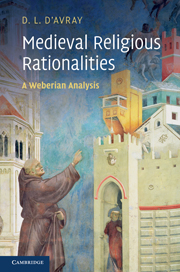Book contents
- Frontmatter
- Contents
- Preface and acknowledgements
- Abbreviations
- 1 Preliminaries
- 2 Medieval values: structures
- 3 Medieval values: dynamics
- 4 The value–instrumental interface in the Middle Ages
- 5 Formal rationality and medieval religious law
- 6 The formal–substantive interface and the dispensation system
- General conclusion
- Bibliography
- Index of manuscripts
- General index
5 - Formal rationality and medieval religious law
Published online by Cambridge University Press: 05 June 2012
- Frontmatter
- Contents
- Preface and acknowledgements
- Abbreviations
- 1 Preliminaries
- 2 Medieval values: structures
- 3 Medieval values: dynamics
- 4 The value–instrumental interface in the Middle Ages
- 5 Formal rationality and medieval religious law
- 6 The formal–substantive interface and the dispensation system
- General conclusion
- Bibliography
- Index of manuscripts
- General index
Summary
Formal rationality is defined here as decision-making within a set of rules constructed to govern an aspect of life abstracted or demarcated from all other aspects, in such a way that the latter are not allowed to affect the decision-making process. These sets of rules frequently serve some purpose beyond themselves, and lack an absolute character, as being man-made and in principle alterable. Insofar as this is true, and so long as the rules do not become values in their own right (as can indeed happen), formal rationality is a species of instrumental rationality. Even as such, however, it tends to be shaped by values and convictions, as the whole preceding line of argument would lead the reader to expect.
Contrary to some modern interpreters of Weber, there is no intrinsic connection between formal rationality and ‘modernity’. Also, formal rationality can be saturated with values, and serve them instrumentally, even when it is not a value in itself. This can be illustrated from many different institutions of the medieval world. Here we will concentrate on monastic legislation and papal law.
Formal rationality and the Carthusians
In the light of the previous chapter it may now be taken as a given that monastic rules are law, even though not a law imposed by the state, and this also holds good for liturgy, the subject of much monastic law.
- Type
- Chapter
- Information
- Medieval Religious RationalitiesA Weberian Analysis, pp. 122 - 149Publisher: Cambridge University PressPrint publication year: 2010
- 1
- Cited by

